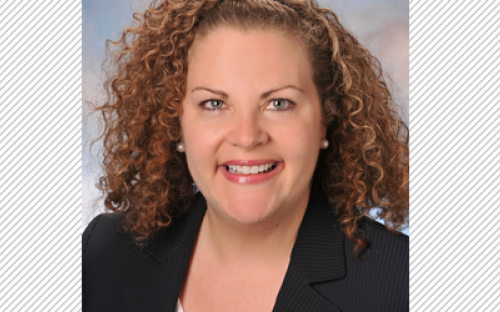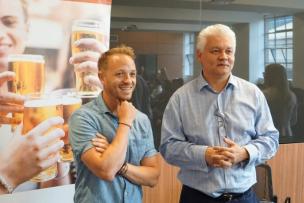BASF produces industrial chemicals such as resins and gases for the pharmaceutical, construction, textile and automotive industries. It also produces plastics; raw materials for many detergents, textile and leather chemicals; herbicides and pesticides; and it explores for oil and gas through its subsidiary Wintershall. The firm has a turnover of €73.5 billion.
Bernadette is based in Florham Park New Jersey. She emphasizes the firm's environmental credentials, stressing that BASF seeks to combine economic success, social responsibility and environmental protection. She talks to us about their ‘CORE’ values, 145-year track record, and international perspective.
What's your role at BASF and how long have you been there?
I’m currently Director of Talent Acquisition, University Relations and Workforce Planning at BASF Corporation, but I’ve previously worked as Director of Human Resources for BASF Mexicana (which encompasses Mexico, Central America and the Caribbean), and before that as a Human Resources Business Partner with BASF Corporation.
All in all, I’ve been with BASF for around six and a half years.
Do you hire any MBAs? What sort of roles might they be suitable for?
Although BASF is known as ‘The Chemical Company’, we offer roles far beyond those which you might traditionally associate with the chemical industry – we don’t just hire engineers and scientists! BASF is a challenging and exciting opportunity for businesses professionals.
We offer a Leadership Development Programme for recent MBA graduates, a two year rotational programme which provides opportunities to gain valuable experience. The programme allows participants to build their leadership skills at different sites across the company.
In addition, we also employ more experienced MBAs in lots of areas, including business management, sales and marketing, procurement, finance, and supply chain.
What advice do you have for MBAs hoping to get a job at your company?
If they are considering taking part in the Leadership Development Programme, they ought to demonstrate excellent business acumen, and plenty of prior work and internship experience. In this global business environment, an international perspective and the ability to speak multiple languages are also preferred.
In addition, we offer an internship programme one year prior to eligibility for the leadership programme, which is a great way for future MBAs to expose themselves to the BASF culture before they apply.
For more experienced MBAs, we need to see evidence of solid career growth over time, a global perspective, and a sense of the importance of diversity and inclusion. I should also mention that prior experience in the chemical industry is not necessarily a requirement!
What are the most exciting things about a career with BASF?
Whatever your career path with BASF, we work to the same ‘CORE’ values: Creativity, Openness, Responsibility and Entrepreneurship.
BASF offers the prospect of career-long learning and development in a global environment, allowing you to build a tight network of very bright colleagues worldwide, and to participate in emerging markets.
Working with BASF also offers the opportunity to impact upon sustainability, and to work for a well-managed company with a proven financial track record – not many companies can say they have a heritage of innovation stretching back 145 years.
Do you think the chemical industry suits business students?
Yes, absolutely! We work in diversified markets, and offer a great experience. Our new global strategy aims to improve the world in which we all live, and to create chemistry for a sustainable future.
BASF offers the opportunity to make a real difference, and to influence the way we impact the world socially, economically and environmentally – something that’s not generally found in the corporate world.
How does BASF's international expansion change what it's like to work with the company?
BASF has always been a strong global company, but it’s becoming more so every day, which means it’s very important that our employees build a strong network of internal colleagues across the world.
It’s great to have contacts you can visit and network with wherever you happen to be globally, and this internationalism is what creates the richness of the company.
We build a diverse and inclusive work environment, and part of that means having an awareness that fellow colleagues may work differently. Even things like being sensitive to the fact that not everyone works to EDT (Eastern Daylight Time) are important!
Can you always tell a good candidate from an interview?
Just like any global company, we have a thorough vetting process before applicants get to the interview stage. CVs should show their past accomplishments, and illustrate how they will provide value for the company. Before the interview stage, we’ve been in touch with most applicant either via our jobs website – which is a great place to learn more about BASF – or via phone conversation.
The interview is only one component of our decision making process, but it’s extremely important as it allows us to quickly get an idea of an applicant’s strengths and weaknesses. We’re looking for the whole package, including a proven track record, although it’s also important for us to consider whether there is a fit between the candidate and BASF throughout the process.
The interview gives applicants plenty of time to demonstrate how they would be suitable, and also to ask us any questions they might have. We deliberately create diverse interview panels, so we can bring together different perspectives from employees in different areas of the company.
What markets are you currently growing in?
Our new global strategy has provided BASF with a really clear road map for the future. An interesting statistic to take into consideration is the fact that, by 2050, there will be an estimated nine billion people in the world, requiring the resources of one and a half earths. We’re intensely focused on the difficulties that this will result in, including the need for food, adequate housing, and transportation, whether by car, plane or train.
BASF offers not just advanced products, but solutions. For example, we’re currently producing innovative materials for use in high performance batteries, and researching clean energies, such as wind and solar power, as well as transportation solutions.
It’s a really exciting time for BASF, and I’d love to invite MBA graduates to come and be a part of it!
Read more about MBA jobs and recruiters here
RECAPTHA :
13
63
b9
6f







